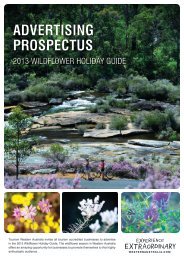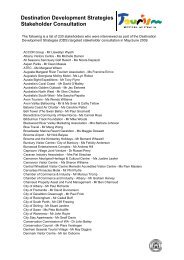Aboriginal Tourism Strategy for Western Australia 2011-2015
Aboriginal Tourism Strategy for Western Australia 2011-2015
Aboriginal Tourism Strategy for Western Australia 2011-2015
Create successful ePaper yourself
Turn your PDF publications into a flip-book with our unique Google optimized e-Paper software.
Difference<br />
Making a<br />
ABORIGINAL TOURISM STRATEGY FOR WESTERN AUSTRALIA <strong>2011</strong> - <strong>2015</strong>
Table of<br />
CONTENTS<br />
Message from the Minister <strong>for</strong> <strong>Tourism</strong> 2<br />
Message from the Chairperson of the <strong>Western</strong> <strong>Australia</strong>n Indigenous <strong>Tourism</strong> Operators Council 3<br />
Introduction 4<br />
Background 5<br />
Listening, Looking, Learning: An <strong>Aboriginal</strong> <strong>Tourism</strong> <strong>Strategy</strong> <strong>for</strong> <strong>Western</strong> <strong>Australia</strong> 2006-2010 5<br />
Making a Difference: <strong>Aboriginal</strong> <strong>Tourism</strong> <strong>Strategy</strong> <strong>for</strong> <strong>Western</strong> <strong>Australia</strong> <strong>2011</strong>-<strong>2015</strong> 6<br />
Definitions 7<br />
Developing the strategy 9<br />
Vision 9<br />
Goals 10<br />
Strategic objectives 10<br />
Implementation 10<br />
Strategic plan 11<br />
Appendix One - Summary of achievements (Listening, Looking, Learning) 16<br />
Appendix Two - Consultation process (Making a Difference) 17<br />
1 MAKING A DIFFERENCE: ABORIGINAL TOURISM STRATEGY FOR WESTERN AUSTRALIA <strong>2011</strong> - <strong>2015</strong>
Message from the<br />
MINISTER<br />
<strong>for</strong> <strong>Tourism</strong><br />
<strong>Aboriginal</strong><br />
tourism is proving to<br />
be a major attraction<br />
<strong>Western</strong> <strong>Australia</strong> offers many extraordinary experiences<br />
<strong>for</strong> its visitors, and <strong>Aboriginal</strong> tourism is proving to be a<br />
major attraction due to its unique culture and history.<br />
Visitors are taking up the opportunity to engage in a range of<br />
authentic experiences involving heritage, arts and crafts and<br />
nature, which provides them with a greater understanding<br />
of the unique spiritual connection the <strong>Aboriginal</strong> people<br />
have with their country.<br />
The State Government, together with the <strong>Western</strong> <strong>Australia</strong>n<br />
Indigenous <strong>Tourism</strong> Operators Council, is committed to<br />
ensuring that the State continues to offer these high quality<br />
<strong>Aboriginal</strong> tourism experiences. To enable this the Making<br />
a Difference: <strong>Aboriginal</strong> <strong>Tourism</strong> <strong>Strategy</strong> <strong>for</strong> <strong>Western</strong><br />
<strong>Australia</strong> <strong>2011</strong>-<strong>2015</strong> has been developed in collaboration<br />
with the <strong>Aboriginal</strong> tourism sector and the wider tourism<br />
industry.<br />
The strategy will play a key role in providing opportunities<br />
<strong>for</strong> the continued development of <strong>Aboriginal</strong> tourism and<br />
position it as an iconic experience in <strong>Western</strong> <strong>Australia</strong>.<br />
It will also help to facilitate social and economic benefits<br />
through increased employment, development opportunities<br />
and visitation to the State.<br />
This is a significant initiative and reflects an integrated<br />
approach to this important issue. I would like to acknowledge<br />
everyone involved in developing the strategy and I look<br />
<strong>for</strong>ward to seeing and experiencing the continued growth<br />
of <strong>Aboriginal</strong> tourism and everything it has to offer.<br />
Dr Kim Hames MLA<br />
Deputy Premier<br />
Minister <strong>for</strong> <strong>Tourism</strong><br />
MAKING A DIFFERENCE: ABORIGINAL TOURISM STRATEGY FOR WESTERN AUSTRALIA <strong>2011</strong> - <strong>2015</strong> 2
Message from the<br />
CHAIRPERSON<br />
of the <strong>Western</strong> <strong>Australia</strong>n Indigenous<br />
<strong>Tourism</strong> Operators Council<br />
<strong>Western</strong> <strong>Australia</strong><br />
is <strong>for</strong>tunate to have inherited<br />
a rich array<br />
of diverse landscapes<br />
and peoples.<br />
Today, <strong>Western</strong> <strong>Australia</strong> is <strong>for</strong>tunate to have inherited<br />
a rich array of diverse landscapes and peoples. Both<br />
have ancient origins and Indigenous traditions, both are<br />
inextricably entwined and share a symbiotic relationship.<br />
Together they give <strong>Western</strong> <strong>Australia</strong> its distinct and<br />
unique identity and set it apart from other global<br />
destinations.<br />
Ancient origins do not mean a guaranteed future. The<br />
sustainability of landscapes and peoples remain at risk and<br />
future opportunities are lost, often as a consequence of<br />
unin<strong>for</strong>med decisions made in isolation.<br />
With knowledge comes understanding. With understanding<br />
comes mutual respect and appreciation of both our<br />
differences and our common aspirations. Indigenous<br />
tourism is about engagement and mutual respect.<br />
This Indigenous tourism strategy provides a very suitable<br />
vehicle to enable Indigenous tourism, government and<br />
the industry to come together, to make a difference, and to<br />
achieve results well beyond which we might individually attain.<br />
We have a collective obligation to our future generations<br />
to in<strong>for</strong>m ourselves and to understand the potential <strong>for</strong><br />
beneficial and detrimental impacts of our decisions on both<br />
landscapes and peoples.<br />
Mr Neville Poelina<br />
Chairperson<br />
<strong>Western</strong> <strong>Australia</strong>n Indigenous <strong>Tourism</strong> Operators Council<br />
3 MAKING A DIFFERENCE: ABORIGINAL TOURISM STRATEGY FOR WESTERN AUSTRALIA <strong>2011</strong> - <strong>2015</strong>
INTRODUCTION<br />
<strong>Aboriginal</strong> culture is often the main focus of <strong>Aboriginal</strong><br />
tourism and features a wide range of activities such as<br />
heritage tours, arts and crafts, per<strong>for</strong>ming arts and naturebased<br />
experiences. These experiences enable visitors<br />
to develop an understanding of the unique spiritual<br />
relationship that <strong>Aboriginal</strong> peoples have with their natural<br />
environment.<br />
However, <strong>Aboriginal</strong> involvement in tourism is not just<br />
confined to cultural tourism. <strong>Aboriginal</strong> organisations<br />
are also co-investors with other mainstream tourism<br />
providers in accommodation and tours. <strong>Aboriginal</strong> people<br />
are also employed by mainstream tourism and hospitality<br />
businesses.<br />
Over the past 10 years there has been significant<br />
development of the <strong>Aboriginal</strong> tourism industry in <strong>Western</strong><br />
<strong>Australia</strong>. In particular, work undertaken by the <strong>Western</strong><br />
<strong>Australia</strong>n Indigenous <strong>Tourism</strong> Operators Council (WAITOC),<br />
<strong>Tourism</strong> <strong>Western</strong> <strong>Australia</strong> (<strong>Tourism</strong> WA) and a range of other<br />
agencies and organisations, has resulted in WA having a<br />
strong and vibrant <strong>Aboriginal</strong> tourism industry.<br />
Significantly, the continued commitment of a range of<br />
government agencies and organisations ensures there<br />
is support <strong>for</strong> the development of this industry and the<br />
promotion of WA’s unique cultures and experiences.<br />
With the recent launch of <strong>Tourism</strong> WA’s ‘Experience<br />
Extraordinary’ brand, the opportunity now exists to build on<br />
this solid foundation. The brand highlights that WA is full<br />
of extraordinary things, which you can only experience in<br />
<strong>Western</strong> <strong>Australia</strong>.<br />
It is important that <strong>Aboriginal</strong> experiences are woven into<br />
the development and promotion of the State to ensure it<br />
becomes an integral part of what makes <strong>Western</strong> <strong>Australia</strong><br />
special. This includes opportunities to integrate <strong>Aboriginal</strong><br />
culture and product into events. This approach will ensure<br />
the ongoing success and sustainability of <strong>Aboriginal</strong> tourism<br />
businesses and enhancement of the <strong>Western</strong> <strong>Australia</strong>n<br />
tourism industry.<br />
MAKING A DIFFERENCE: ABORIGINAL TOURISM STRATEGY FOR WESTERN AUSTRALIA <strong>2011</strong> - <strong>2015</strong> 4
BACKGROUND<br />
Listening, Looking, Learning<br />
In 2006, Listening, Looking, Learning: An <strong>Aboriginal</strong><br />
<strong>Tourism</strong> <strong>Strategy</strong> <strong>for</strong> <strong>Western</strong> <strong>Australia</strong> 2006-2010 was<br />
launched by <strong>Tourism</strong> WA.<br />
The vision <strong>for</strong> this strategy was:<br />
<strong>Western</strong> <strong>Australia</strong><br />
would be the premier<br />
destination <strong>for</strong> authentic<br />
<strong>Aboriginal</strong><br />
tourism experiences.<br />
The strategy had two goals:<br />
• To ensure sustainable <strong>Aboriginal</strong> participation in the<br />
tourism industry<br />
• To see <strong>Aboriginal</strong> people having ongoing opportunities<br />
to add cultural and commercial value to the WA tourism<br />
industry, <strong>for</strong> mutual benefits.<br />
A summary of the key outcomes and achievements of this<br />
strategy is provided in Appendix One.<br />
5 MAKING A DIFFERENCE: ABORIGINAL TOURISM STRATEGY FOR WESTERN AUSTRALIA <strong>2011</strong> - <strong>2015</strong>
Making a<br />
Difference<br />
<strong>Aboriginal</strong> <strong>Tourism</strong> <strong>Strategy</strong><br />
<strong>for</strong> <strong>Western</strong> <strong>Australia</strong> <strong>2011</strong> - <strong>2015</strong><br />
In 2006, there were 65 <strong>Aboriginal</strong> organisations operating<br />
a tourism business. In 2008/09, 44 of these businesses<br />
were still operating and the total number of <strong>Aboriginal</strong><br />
organisations had increased to 109 (14 export ready, 41<br />
market ready and 54 emerging).<br />
In 2010/11 there are 113 <strong>Aboriginal</strong> tourism businesses<br />
in operation (18 export ready, 41 market ready and 54<br />
emerging). This represents a 28 per cent increase in export<br />
ready product from 2006, noting that the original strategy<br />
set a key per<strong>for</strong>mance indicator of a 20 per cent increase<br />
<strong>for</strong> this period.<br />
Despite the significant impact that has been made over<br />
the past five years, it is important that support <strong>for</strong> this<br />
industry continues. While the Global Financial Crisis has<br />
affected the climate <strong>for</strong> tourism development over recent<br />
years, <strong>Aboriginal</strong> tourism experiences are still highly sought<br />
after with 66 per cent of overall visitors and 83 per cent of<br />
international visitors seeking to participate in these activities<br />
in <strong>Western</strong> <strong>Australia</strong>. 1<br />
A particular challenge is that visitors may think that all<br />
<strong>Aboriginal</strong> tourism experiences are the same and if they<br />
have already undertaken an <strong>Aboriginal</strong> tourism activity they<br />
may not seek another.<br />
Consequently, there continues to be a need to assist<br />
<strong>Aboriginal</strong> tourism businesses in their business planning,<br />
marketing, access to funding and other support, including<br />
employment and training. Provision of leadership, advocacy,<br />
marketing and networking support <strong>for</strong> <strong>Aboriginal</strong> businesses<br />
to enable them to become a part of the mainstream tourism<br />
product offered by <strong>Western</strong> <strong>Australia</strong> is also important.<br />
Opportunities also exist to integrate <strong>Aboriginal</strong> culture within<br />
tourism events and activities.<br />
To ensure this is achieved, the following strategy has been<br />
developed to provide a cohesive and coordinated approach<br />
to <strong>Aboriginal</strong> tourism in <strong>Western</strong> <strong>Australia</strong>.<br />
1<br />
<strong>Tourism</strong> WA (2010) Visitor Experiences & Expectations – Research 2009/2010.<br />
MAKING A DIFFERENCE: ABORIGINAL TOURISM STRATEGY FOR WESTERN AUSTRALIA <strong>2011</strong> - <strong>2015</strong> 6
Definitions<br />
For the purposes of this strategy:<br />
• <strong>Tourism</strong> is defined as: “The temporary movement<br />
of people from where they normally live or work, the<br />
activities they do while they are away and the facilities<br />
needed to cater <strong>for</strong> their needs while they are away.” 2<br />
• <strong>Aboriginal</strong> <strong>Tourism</strong> Business is the term broadly used<br />
to describe the participation of <strong>Aboriginal</strong> people in<br />
tourism, either directly through jobs and employment,<br />
or through ownership of business enterprise. 3<br />
• <strong>Aboriginal</strong> <strong>Tourism</strong> Products are:<br />
Export Ready is defined by <strong>Tourism</strong> <strong>Australia</strong> as having<br />
the following characteristics: 5<br />
- Documented business plan which includes a<br />
marketing plan<br />
- Consistently delivers on a program it commits to in<br />
relation to stated opening hours or program delivery<br />
- Data collection mechanisms in place to know visitor<br />
numbers per year and major market in<strong>for</strong>mation<br />
- Booking mechanisms in place <strong>for</strong> domestic and<br />
- Wholly-owned and operated by <strong>Aboriginal</strong> people<br />
international markets i.e. email facilities and<br />
responds within 12 hours and is available to take<br />
- Operated in partnership with non-<strong>Aboriginal</strong> people<br />
and have the ongoing consent of the appropriate<br />
<strong>Aboriginal</strong> people. A recognised <strong>Aboriginal</strong> authority<br />
such as local <strong>Aboriginal</strong> land councils, local<br />
Traditional Elders councils or local registered<br />
bookings seven days per week<br />
- Understand the distribution system, pricing and<br />
commission structures i.e. commissionable to suit<br />
the international market<br />
<strong>Aboriginal</strong> corporations may provide this consent<br />
- Understand the needs of the domestic and<br />
- Those businesses that are owned and/or controlled<br />
international markets<br />
by <strong>Aboriginal</strong> people, as well as those non- - Works cooperatively with the state tourism<br />
<strong>Aboriginal</strong> businesses (i.e. mainstream businesses)<br />
organisation<br />
that deliver authentic <strong>Aboriginal</strong> cultural experiences<br />
(developed by way of joint ventures or collaborative<br />
- Works cooperatively with the regional tourism<br />
organisations/associations and local tourism<br />
association<br />
- Strong understanding of customer service<br />
environment<br />
- Must be saleable in a manner and at a cost suitable<br />
to wholesalers<br />
- Website maintained with current in<strong>for</strong>mation<br />
available on products, times, prices etc<br />
- Relevant licenses and insurances.<br />
2 <strong>Tourism</strong> <strong>Western</strong> <strong>Australia</strong> 2000.<br />
3 <strong>Tourism</strong> <strong>Western</strong> <strong>Australia</strong> (2006) Listening, Looking, Learning: An <strong>Aboriginal</strong><br />
<strong>Tourism</strong> <strong>Strategy</strong> <strong>for</strong> <strong>Western</strong> <strong>Australia</strong> 2006-2010.<br />
4 <strong>Tourism</strong> <strong>Western</strong> <strong>Australia</strong> (2006) Listening, Looking, Learning: An <strong>Aboriginal</strong><br />
<strong>Tourism</strong> <strong>Strategy</strong> <strong>for</strong> <strong>Western</strong> <strong>Australia</strong> 2006-2010.<br />
5 <strong>Tourism</strong> <strong>Australia</strong> (2007) National Indigenous <strong>Tourism</strong> Product Manual.<br />
7 MAKING A DIFFERENCE: ABORIGINAL TOURISM STRATEGY FOR WESTERN AUSTRALIA <strong>2011</strong> - <strong>2015</strong>
Definitions continued<br />
• Market Ready is defined by <strong>Tourism</strong> <strong>Australia</strong> as having<br />
the following characteristics: 6<br />
- Reasonable understanding of the tourism industry<br />
- High level of community, family and/or individual<br />
motivation<br />
- Strong understanding of customer service<br />
environment<br />
- Participation in the local, regional tourism industry<br />
- Well progressed with business planning but not yet<br />
addressed specific tourism marketing requirements<br />
- Community/family-based model but has strong<br />
business focus<br />
- Undertaken some level of training<br />
- Exposure/experience in the international market<br />
- Have administrative procedures in a place (<strong>for</strong><br />
bookings and book keeping)<br />
- Website and email (responds within 24 hours)<br />
- Can facilitate industry and media familiarisations<br />
with assistance<br />
- Operates seven days or to a regular departure<br />
schedule (depending on seasonality)<br />
• Emerging businesses are those that are in their start-up<br />
or creation stage and are not yet available to the public<br />
or suitable <strong>for</strong> the major tourism distribution systems.<br />
• Indigenous <strong>Tourism</strong> Product Seeker participates in at<br />
least one of the following during their trip:<br />
6 Ibid.<br />
- Goes on a tour with an Indigenous guide<br />
- Stays in Indigenous accommodation<br />
- Visits an Indigenous cultural centre or location<br />
- Visits an Indigenous gallery<br />
- Attends an Indigenous festival<br />
- Sees Indigenous dance or a theatre per<strong>for</strong>mance<br />
- Sees any Indigenous art, craft or cultural display<br />
- Sees an Indigenous site or Indigenous community<br />
- Purchases Indigenous art, craft or souvenirs<br />
- Some other interaction with Indigenous people. 7<br />
7 <strong>Tourism</strong> Research <strong>Australia</strong> (2010) – Indigenous tourism in <strong>Australia</strong>: Profiling<br />
the domestic market. <strong>Australia</strong>n Government. Department of Resources,<br />
Energy & <strong>Tourism</strong>.<br />
- Is commissionable to suit the domestic market<br />
- Have relevant licenses and insurances.<br />
MAKING A DIFFERENCE: ABORIGINAL TOURISM STRATEGY FOR WESTERN AUSTRALIA <strong>2011</strong> - <strong>2015</strong> 8
Developing the strategy<br />
The purpose of this strategy is to facilitate a collaborative<br />
and integrated approach to the ongoing development<br />
of a sustainable, credible and visible <strong>Aboriginal</strong> tourism<br />
industry. This will enable the continued development of a<br />
robust tourism industry in <strong>Western</strong> <strong>Australia</strong>. The strategy<br />
is designed to in<strong>for</strong>m the following key stakeholders of<br />
actions to achieve this:<br />
• Existing and future <strong>Aboriginal</strong> tourism operators<br />
• WAITOC, the peak body that provides overall leadership<br />
<strong>for</strong> the <strong>Aboriginal</strong> tourism sector<br />
• Mainstream tourism businesses, especially those<br />
looking <strong>for</strong> joint venture opportunities to deliver<br />
authentic <strong>Aboriginal</strong> experiences<br />
• <strong>Tourism</strong> WA, which has responsibility <strong>for</strong> marketing<br />
<strong>Western</strong> <strong>Australia</strong> as a tourism destination<br />
• Regional tourism organisations, which have<br />
responsibility <strong>for</strong> marketing <strong>Western</strong> <strong>Australia</strong> at a<br />
regional level<br />
• State and <strong>Australia</strong>n government agencies, which have<br />
a critical role in <strong>Aboriginal</strong> policy development and<br />
specific programs <strong>for</strong> <strong>Aboriginal</strong> tourism<br />
• Local governments and regional local government<br />
authorities that are seeking to support <strong>Aboriginal</strong><br />
tourism development or preparing local tourism<br />
planning strategies<br />
• Regional development commissions wishing to develop<br />
region-level plans and strategies <strong>for</strong> <strong>Aboriginal</strong> tourism.<br />
In developing the strategy, a comprehensive consultation<br />
process has been undertaken as outlined in Appendix<br />
Two. This highlighted two key elements that needed to be<br />
rein<strong>for</strong>ced through the development of the strategy:<br />
• Strengthen the strong foundations that have already<br />
been developed by the original strategy and the work<br />
of <strong>Tourism</strong> WA and WAITOC in building the <strong>Aboriginal</strong><br />
tourism industry<br />
• The importance of ensuring that <strong>Aboriginal</strong> tourism<br />
is an integral part of the <strong>Western</strong> <strong>Australia</strong>n tourism<br />
industry and has the widest appeal and the best chance<br />
of sustainability. The unique contribution of <strong>Aboriginal</strong><br />
tourism will benefit the whole <strong>Western</strong> <strong>Australia</strong>n<br />
tourism industry.<br />
In addition, the consultation process identified a number of<br />
key factors that needed to be considered. These included<br />
opportunities <strong>for</strong> <strong>Aboriginal</strong> tourism industry ownership,<br />
removal of barriers, delivering benefits <strong>for</strong> <strong>Aboriginal</strong> people<br />
and increasing the availability and quality of <strong>Aboriginal</strong><br />
tourism products.<br />
The two key elements and the in<strong>for</strong>mation identified through<br />
the consultation process was used to in<strong>for</strong>m and establish<br />
the following vision, goals and strategic objectives to<br />
guide <strong>Aboriginal</strong> tourism development in <strong>Western</strong> <strong>Australia</strong><br />
between <strong>2011</strong>-<strong>2015</strong>.<br />
VISION<br />
Quality<br />
<strong>Aboriginal</strong> tourism<br />
experiences provide<br />
unique <strong>Western</strong><br />
<strong>Australia</strong>n<br />
experiences<br />
9 MAKING A DIFFERENCE: ABORIGINAL TOURISM STRATEGY FOR WESTERN AUSTRALIA <strong>2011</strong> - <strong>2015</strong>
Developing the strategy<br />
continued<br />
GOALS<br />
The strategy will:<br />
• Provide pathways and opportunities <strong>for</strong> the sustainable<br />
development of <strong>Aboriginal</strong> tourism experiences<br />
• Enable <strong>Aboriginal</strong> tourism businesses and the wider<br />
tourism industry to work collectively, bringing culture and<br />
commerce together in a manner that leverages and adds<br />
value to each other<br />
• Position the <strong>Aboriginal</strong> tourism industry as a sustainable<br />
iconic tourism experience.<br />
Strategic objectives<br />
To achieve the vision and goals, four key areas and associated<br />
high level strategic objectives are identified:<br />
• Positioning and marketing<br />
- Ensure that <strong>Aboriginal</strong> tourism provides a competitive<br />
advantage and encourages international visitors to<br />
come to WA as the first point of call to have a quality<br />
<strong>Aboriginal</strong> tourism experience in <strong>Australia</strong><br />
- Increase the participation of domestic and international<br />
visitors in <strong>Aboriginal</strong> tourism experiences in <strong>Western</strong><br />
<strong>Australia</strong><br />
• Industry and government partnerships<br />
- Provide efficient and effective government and<br />
industry support <strong>for</strong> <strong>Aboriginal</strong> tourism<br />
• Quality product<br />
- Ensure the development of authentic, consistent and<br />
sustainable <strong>Aboriginal</strong> tourism products<br />
• Industry capacity<br />
- Strengthen the level of skills and training within the<br />
<strong>Aboriginal</strong> tourism industry<br />
- Ensure that opportunities are available to obtain<br />
training and qualifications consistent with those of the<br />
mainstream tourism industry.<br />
Implementation<br />
<strong>Tourism</strong> WA continues to strongly support the development of<br />
<strong>Aboriginal</strong> tourism experiences through marketing/promotion<br />
and partnerships with other organisations. However, there is<br />
a strong need <strong>for</strong> broad scale engagement in the delivery of<br />
the strategy and a structured and coordinated approach to<br />
ensure the strategic initiatives are implemented.<br />
A number of key organisations will have responsibility <strong>for</strong> the<br />
delivery of components of the strategy:<br />
• <strong>Tourism</strong> WA will focus on the development and<br />
implementation of marketing initiatives including<br />
promoting <strong>Aboriginal</strong> tourism within the new Experience<br />
Extraordinary campaign. <strong>Tourism</strong> WA will also have an<br />
ongoing role in overseeing the implementation of the<br />
strategy and progress on the identified actions<br />
• The Small Business Development Corporation (SBDC)<br />
provides advisory services to all small businesses<br />
including those in the tourism sector. SBDC has a<br />
dedicated <strong>Aboriginal</strong> Business Unit, which works with<br />
<strong>Aboriginal</strong> businesses across a range of sectors. SBDC<br />
also draws on the network of 25 small business centres,<br />
located across <strong>Western</strong> <strong>Australia</strong>, delivering business and<br />
advisory services to <strong>Aboriginal</strong> clients as well as building<br />
capacity and providing business support<br />
• The <strong>Western</strong> <strong>Australia</strong>n Indigenous <strong>Tourism</strong> Operators<br />
Council (WAITOC) will focus on its core roles of marketing,<br />
advocacy, encouraging partnerships and networking.<br />
WAITOC has secured funding from <strong>Tourism</strong> WA and the<br />
Department of Regional Development and Lands (DRDL)<br />
through the Royalties <strong>for</strong> Regions program, to continue its<br />
role in providing industry leadership<br />
• The Department of Training and Work<strong>for</strong>ce Development<br />
(DTWD) has prepared a work<strong>for</strong>ce development plan<br />
<strong>for</strong> <strong>Western</strong> <strong>Australia</strong>n tourism, hospitality and event<br />
industries. This plan discusses the need to increase<br />
<strong>Aboriginal</strong> employment in this industry and it identifies<br />
measures to address this<br />
• A range of other State and <strong>Australia</strong>n government<br />
agencies and organisations will also be engaged in the<br />
delivery of the strategy focusing on their specific areas<br />
of expertise. Key strategies and actions are highlighted in<br />
the following tables to achieve this.<br />
In addition, there is an important role <strong>for</strong> regional business<br />
and economic development agencies including land and<br />
sea councils, regional development commissions and the<br />
Regional Development Council. There are also a number of<br />
<strong>Australia</strong>n Government programs that provide support <strong>for</strong><br />
Indigenous business and economic development.<br />
It is also likely that a range of programs and support structures<br />
will be needed in different regions due to the varying maturity<br />
of the tourism industries. This will need to be taken into<br />
account in the development of programs.<br />
One option that could be considered is the development of<br />
regional strategies aimed at developing <strong>Aboriginal</strong> tourism.<br />
MAKING A DIFFERENCE: ABORIGINAL TOURISM STRATEGY FOR WESTERN AUSTRALIA <strong>2011</strong> - <strong>2015</strong> 10
STRATEGIC<br />
PLAN<br />
1. Positioning and marketing<br />
Outcome 1: Ensure that <strong>Aboriginal</strong> tourism provides a competitive advantage and encourages international visitors to come<br />
to WA as the first point of call to have a quality <strong>Aboriginal</strong> tourism experience in <strong>Australia</strong>.<br />
Outcome 2: Increase the participation of domestic and international visitors in <strong>Aboriginal</strong> tourism in <strong>Western</strong> <strong>Australia</strong>.<br />
<strong>Strategy</strong> Actions Partners<br />
1. Create a<br />
compelling point<br />
of difference<br />
<strong>for</strong> <strong>Aboriginal</strong><br />
tourism<br />
to attract<br />
international<br />
visitors.<br />
● Ensure the Experience Extraordinary marketing campaign highlights the<br />
unique <strong>Aboriginal</strong> tourism attributes of <strong>Western</strong> <strong>Australia</strong>.<br />
● Use research data to identify consumer markets and assist operators to<br />
target their own marketing ef<strong>for</strong>ts.<br />
● Ensure that <strong>Aboriginal</strong> tourism products are considered by <strong>Tourism</strong><br />
<strong>Australia</strong> under the National Landscapes program and by the relevant<br />
steering committees in the Experience Development <strong>Strategy</strong> process.<br />
<strong>Tourism</strong> wa, waitoc,<br />
atec and TA<br />
2. Integrate<br />
<strong>Aboriginal</strong><br />
tourism product<br />
into mainstream<br />
domestic<br />
tourism.<br />
● As part of the Experience Extraordinary campaign, effectively promote<br />
the <strong>Aboriginal</strong> tourism industry to local and interstate markets through<br />
advertising, public relations, media awareness and development of<br />
distribution channels.<br />
● Encourage partnerships that enable <strong>Aboriginal</strong> tourism operator<br />
engagement with regional tourism organisations and the Visitor Centre<br />
Association of <strong>Western</strong> <strong>Australia</strong>.<br />
● Provide ongoing support <strong>for</strong> waitoc as the peak industry body.<br />
● Use research data to identify consumer markets and assist operators to<br />
target their own marketing ef<strong>for</strong>ts.<br />
● Align <strong>Aboriginal</strong> tourism product with relevant domestic distribution<br />
channels.<br />
● Support <strong>Aboriginal</strong> tourism <strong>for</strong>ums that facilitate engagement between<br />
<strong>Aboriginal</strong> tourism operators and market distribution channels.<br />
● Encourage the integration of <strong>Aboriginal</strong> culture and product into events<br />
and activities.<br />
<strong>Tourism</strong> wa, waitoc<br />
and the tourism<br />
industry<br />
11 MAKING A DIFFERENCE: ABORIGINAL TOURISM STRATEGY FOR WESTERN AUSTRALIA <strong>2011</strong> - <strong>2015</strong>
STRATEGIC<br />
PLAN<br />
continued<br />
2. Industry and government partnerships<br />
Outcome 1: Provide efficient and effective government support <strong>for</strong> <strong>Aboriginal</strong> tourism.<br />
<strong>Strategy</strong> Actions Partners<br />
1. Facilitate and support<br />
opportunities <strong>for</strong> access<br />
to land and tenure <strong>for</strong> the<br />
development of tourism.<br />
● Through existing processes, support <strong>Aboriginal</strong> land holding<br />
bodies or potential new businesses to enhance decisionmaking<br />
with respect to use of <strong>Aboriginal</strong> land <strong>for</strong> tourism<br />
purposes.<br />
● Support the protection of <strong>Aboriginal</strong> heritage and the natural<br />
environment <strong>for</strong> potential tourism development.<br />
DEC, DIA, DOP,<br />
DRDL, ALT, ILC, ONT<br />
and LGAs<br />
2. Support industry in<br />
managing and interfacing<br />
with government.<br />
● Assist operators with accessing sources of funding, business<br />
development and marketing support.<br />
● Assist with the <strong>for</strong>mation of <strong>Aboriginal</strong> tourism networks at<br />
regional, state and national levels to support and increase<br />
industry participation.<br />
● Support the continued development of WAITOC as the<br />
peak industry body and its responsibility <strong>for</strong> <strong>Aboriginal</strong><br />
tourism marketing, advocacy, encouraging partnerships and<br />
networking.<br />
WAITOC, SBDC,<br />
<strong>Tourism</strong> WA, RTOs<br />
and LGAs<br />
3. Ensure opportunities <strong>for</strong><br />
involvement in government<br />
tourism programs are<br />
maximised.<br />
4. Work collaboratively with<br />
others to facilitate tourism<br />
development including<br />
joint venture opportunities.<br />
● Incorporate <strong>Aboriginal</strong> tourism into existing tourism<br />
development initiatives and programs.<br />
● Assist operators with access to sources of public investment.<br />
WAITOC, SBDC,<br />
<strong>Tourism</strong> WA, RDCs,<br />
RTOs and LGAs<br />
IBA, ILC, DRDL,<br />
tourism industry and<br />
LGAs<br />
MAKING A DIFFERENCE: ABORIGINAL TOURISM STRATEGY FOR WESTERN AUSTRALIA <strong>2011</strong> - <strong>2015</strong> 12
STRATEGIC<br />
PLAN<br />
continued<br />
3. Quality product<br />
Outcome 1: Ensure the development of authentic, consistent and sustainable <strong>Aboriginal</strong> tourism products.<br />
<strong>Strategy</strong> Actions Partners<br />
1. Support the development<br />
of viable and sustainable<br />
<strong>Aboriginal</strong> tourism<br />
businesses.<br />
● Provide business advice, training and support <strong>for</strong> both startup<br />
and established businesses.<br />
● Provide structured learning opportunities <strong>for</strong> aspiring,<br />
emerging, market and export ready operators to undertake<br />
familiarisation tours with both mainstream and other<br />
<strong>Aboriginal</strong> tourism operators.<br />
● Develop contemporary and culturally authentic products to<br />
align and integrate with the mainstream tourism industry.<br />
● Keep the industry in<strong>for</strong>med about current issues and<br />
opportunities.<br />
SBDC, WAITOC, IBA,<br />
RDCs, <strong>Tourism</strong> WA<br />
(industry in<strong>for</strong>mation),<br />
tourism industry and<br />
ATEC<br />
2. Support accreditation<br />
of <strong>Aboriginal</strong> tourism<br />
businesses.<br />
● Support and encourage accreditation of <strong>Aboriginal</strong> tourism<br />
operations where appropriate.<br />
TCWA, DRET,<br />
WAITOC and<br />
<strong>Tourism</strong> WA<br />
3. Promote success stories as<br />
best practice examples.<br />
● Develop and promote case studies of successful businesses<br />
to demonstrate examples of authentic, consistent and<br />
sustainable products. Also highlight the challenges and<br />
lessons learned from these businesses that can be used to<br />
benefit future businesses.<br />
TA, <strong>Tourism</strong> WA,<br />
SBDC, IBA and TCWA<br />
13 MAKING A DIFFERENCE: ABORIGINAL TOURISM STRATEGY FOR WESTERN AUSTRALIA <strong>2011</strong> - <strong>2015</strong>
STRATEGIC<br />
PLAN<br />
continued<br />
4. Industry capacity<br />
Outcome 1: Strengthen the level of skills and training within the <strong>Aboriginal</strong> tourism industry.<br />
Outcome 2: Ensure that opportunities are available to obtain training and qualifications consistent with those of the<br />
mainstream tourism industry.<br />
<strong>Strategy</strong> Actions Partners<br />
1. Provide opportunities <strong>for</strong><br />
employment in tourism<br />
and hospitality and create<br />
pathways <strong>for</strong> <strong>Aboriginal</strong><br />
people to build careers in<br />
the tourism and hospitality<br />
industry.<br />
● Deliver innovative and culturally appropriate mentoring and<br />
training <strong>for</strong> <strong>Aboriginal</strong> people to develop skills in the tourism<br />
and hospitality industry.<br />
DTWD and the<br />
tourism industry<br />
2. Create traineeships and<br />
cadetships to provide<br />
employment opportunities.<br />
3. Develop a program of<br />
cross-cultural training and<br />
awareness of opportunities<br />
<strong>for</strong> both employees and<br />
employers.<br />
● Identify a prospective pool of both <strong>Aboriginal</strong> and non-<br />
<strong>Aboriginal</strong> employers with capacity to provide traineeship and<br />
cadetship opportunities in the tourism industry.<br />
● Ensure that training is relevant and supported by real job<br />
opportunities.<br />
● Monitor and report on how the cadetship and traineeship<br />
programs translate into job prospects following completion of<br />
the program.<br />
● Encourage cross-cultural training <strong>for</strong> both <strong>Aboriginal</strong> and<br />
non-<strong>Aboriginal</strong> people to improve mutual understanding of<br />
workplace and industry expectations and opportunities.<br />
DTWD<br />
DTWD and WAITOC<br />
MAKING A DIFFERENCE: ABORIGINAL TOURISM STRATEGY FOR WESTERN AUSTRALIA <strong>2011</strong> - <strong>2015</strong> 14
Glossary of acronyms<br />
<strong>Aboriginal</strong> Lands Trust (ALT)<br />
<strong>Australia</strong>n <strong>Tourism</strong> Export Council (ATEC)<br />
Department of Environment and Conservation (DEC)<br />
Department of Indigenous Affairs (DIA)<br />
Department of Planning (DOP)<br />
Department of Regional Development and Lands (DRDL)<br />
Department of Resources, Energy and <strong>Tourism</strong> (DRET)<br />
Department of Training and Work<strong>for</strong>ce Development (DTWD)<br />
Indigenous Business <strong>Australia</strong> (IBA)<br />
Indigenous Land Corporation (ILC)<br />
Local Government Authorities (LGAs)<br />
Office of Native Title (ONT)<br />
Regional Development Commissions (RDCs)<br />
Regional <strong>Tourism</strong> Organisation (RTO)<br />
Small Business Development Corporation (SBDC)<br />
<strong>Tourism</strong> <strong>Australia</strong> (TA)<br />
<strong>Tourism</strong> Council <strong>Western</strong> <strong>Australia</strong> Ltd (TCWA)<br />
<strong>Tourism</strong> <strong>Western</strong> <strong>Australia</strong> (<strong>Tourism</strong> WA)<br />
<strong>Western</strong> <strong>Australia</strong>n Indigenous <strong>Tourism</strong> Operators Council (WAITOC)<br />
15 MAKING A DIFFERENCE: ABORIGINAL TOURISM STRATEGY FOR WESTERN AUSTRALIA <strong>2011</strong> - <strong>2015</strong>
APPENDIX ONE<br />
Summary of achievements<br />
Listening, Looking, Learning:<br />
An <strong>Aboriginal</strong> <strong>Tourism</strong> <strong>Strategy</strong> For <strong>Western</strong> <strong>Australia</strong> 2006-2010<br />
<strong>Strategy</strong> achievements<br />
Over the period of the strategy, significant ef<strong>for</strong>t was<br />
focussed on the development of <strong>Aboriginal</strong> tourism<br />
businesses to assist them in becoming market or export<br />
ready and improve the quality of products available. A<br />
number of initiatives were developed through <strong>Tourism</strong><br />
WA and a range of other State and <strong>Australia</strong>n government<br />
agencies and organisations to facilitate the growth of the<br />
<strong>Aboriginal</strong> tourism sector.<br />
Quality<br />
The tourism industry relies on the provision of quality<br />
products <strong>for</strong> its survival. One of the ways of ensuring<br />
quality is through the attainment of industry-recognised<br />
accreditation. In 2009, a program was developed with<br />
TCWA, <strong>Tourism</strong> WA and WAITOC to ensure that as<br />
many businesses as possible were guided through the<br />
accreditation process. Over the course of the program, 49<br />
businesses were mentored through the process.<br />
Industry development<br />
It is important to clearly understand the needs of the<br />
industry be<strong>for</strong>e assistance programs are developed. One<br />
of the major initiatives over the period of the strategy was<br />
to take businesses through a needs analysis process to<br />
fully understand their individual requirements. Forty-seven<br />
businesses completed a business needs analysis, which<br />
looked at business aspirations, needs and wants and<br />
identified ways to boost marketing and business practices.<br />
Following the needs analysis process, a capacity building<br />
program was developed which provided assistance<br />
to individual businesses to meet their highest priority<br />
requirements. This program included marketing collateral<br />
development, physical resources and equipment, staff<br />
training and development and professional services.<br />
Industry support<br />
WAITOC, <strong>for</strong>med in 2000, has become an internationally<br />
recognised leader in the development of Indigenous tourism.<br />
Over the period of the strategy, WAITOC has continued to<br />
provide support to <strong>Aboriginal</strong> tourism businesses through<br />
marketing, advocacy, partnership and networking ef<strong>for</strong>ts.<br />
WAITOC continues to represent the <strong>Aboriginal</strong> tourism<br />
industry and helps develop national and international<br />
awareness of the diversity of <strong>Aboriginal</strong> tourism products.<br />
In addition, businesses have an opportunity to develop their<br />
knowledge and confidence by attending the <strong>Australia</strong>n<br />
<strong>Tourism</strong> Exchange and other national and international<br />
trade shows.<br />
Employment and training<br />
It is important to identify skills and abilities that will be<br />
required to ensure the long term sustainability of the<br />
industry. Over the course of the strategy, an innovative<br />
<strong>Aboriginal</strong> employment initiative was undertaken to build<br />
skills and confidence in young <strong>Aboriginal</strong> people entering<br />
the work<strong>for</strong>ce.<br />
In 2005, <strong>Tourism</strong> WA in cooperation with the Hospitality<br />
and <strong>Tourism</strong> Industry Training Council (WA) established an<br />
Indigenous traineeship program <strong>for</strong> visitor centres. As a<br />
result, 28 visitor centres, including the <strong>Western</strong> <strong>Australia</strong>n<br />
Visitor Centre, employed 30 Indigenous trainees.<br />
In mid 2007, the Federal Department <strong>for</strong> Employment,<br />
Education and Work<strong>for</strong>ce Relations’ funding was increased,<br />
providing opportunities <strong>for</strong> <strong>Aboriginal</strong> people to undertake<br />
supported traineeships within the general tourism and<br />
hospitality industry. In the first two years, the initiative<br />
met or exceeded the target numbers of new cadets and<br />
trainees. Between 2007 and 2010, 38 people were placed<br />
in traineeships and eight people in cadetships.<br />
The overall aim of this program has been the continued<br />
development of quality tourism products that are market<br />
and export ready.<br />
MAKING A DIFFERENCE: ABORIGINAL TOURISM STRATEGY FOR WESTERN AUSTRALIA <strong>2011</strong> - <strong>2015</strong> 16
APPENDIX TWO<br />
Consultation process<br />
Making a Difference:<br />
<strong>Aboriginal</strong> <strong>Tourism</strong> <strong>Strategy</strong> <strong>for</strong> <strong>Western</strong> <strong>Australia</strong> <strong>2011</strong>-<strong>2015</strong><br />
The strategy has been developed through close consultation<br />
with the tourism industry. <strong>Aboriginal</strong> and mainstream<br />
tourism and government organisations were invited to<br />
participate in a working party to develop the vision, goals<br />
and broad strategies. A series of facilitated workshops<br />
were then held to assist in creating a draft document.<br />
The draft document was then released to industry <strong>for</strong> input<br />
and feedback. The consultation process lasted 14 weeks<br />
and 26 workshops were held across <strong>Western</strong> <strong>Australia</strong>. In<br />
some locations, two workshops were held. The first was<br />
with government agencies, local government authorities,<br />
mainstream tourism and other industry groups. The second<br />
workshop was held with <strong>Aboriginal</strong> tourism businesses,<br />
stakeholders, communities and individuals aspiring to be part<br />
of the tourism industry.<br />
The in<strong>for</strong>mation obtained through these consultations was<br />
used to develop a draft strategy. This document was circulated<br />
<strong>for</strong> comment to State and <strong>Australia</strong>n government agencies,<br />
and key stakeholders including WAITOC who participated in<br />
its development. It was then referred to the <strong>Tourism</strong> WA Board<br />
<strong>for</strong> noting at its meeting on 28 October 2010.<br />
Public consultation involving previous workshop participants<br />
and the general public was then completed over a four<br />
week period. The comments were considered and the draft<br />
strategy amended accordingly.<br />
17 MAKING A DIFFERENCE: ABORIGINAL TOURISM STRATEGY FOR WESTERN AUSTRALIA <strong>2011</strong> - <strong>2015</strong>
<strong>Tourism</strong> <strong>Western</strong> <strong>Australia</strong><br />
Level 9<br />
2 Mill Street<br />
PERTH WA 6000<br />
GPO Box X2261<br />
PERTH WA 6847<br />
Tel: 08 9262 1700<br />
Fax: 08 9262 1702<br />
info@westernaustralia.com<br />
westernaustralia.com<br />
tourism.wa.gov.au<br />
All images courtesy of the <strong>Western</strong> <strong>Australia</strong>n Indigenous <strong>Tourism</strong> Operators Council.<br />
Copyright and all other relevant laws. As each business situation is different no<br />
responsibility or representation is accepted or given <strong>for</strong> the use of the content in this<br />
document and each user should take their own professional advice accordingly.



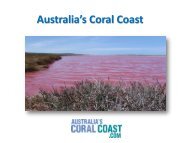
![Annual Report 2002 - 2003 [pdf ] - Tourism Western Australia](https://img.yumpu.com/27124309/1/186x260/annual-report-2002-2003-pdf-tourism-western-australia.jpg?quality=85)
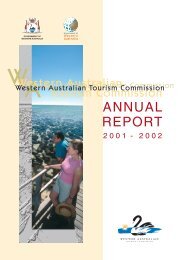
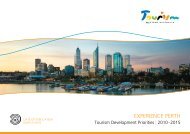
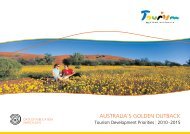
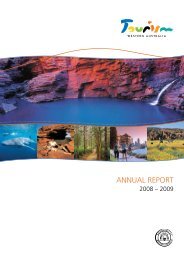
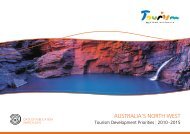

![Our Direction in China 2012 - 2015 [pdf ] - Tourism Western Australia](https://img.yumpu.com/27124271/1/184x260/our-direction-in-china-2012-2015-pdf-tourism-western-australia.jpg?quality=85)
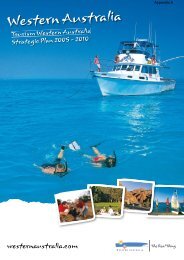
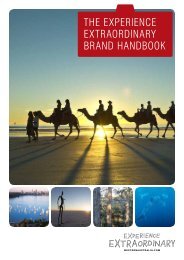
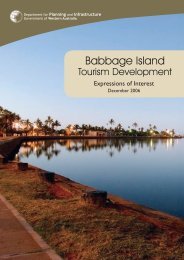
![Naturebank Program 2011 [pdf ] - Tourism Western Australia](https://img.yumpu.com/27124244/1/184x260/naturebank-program-2011-pdf-tourism-western-australia.jpg?quality=85)
